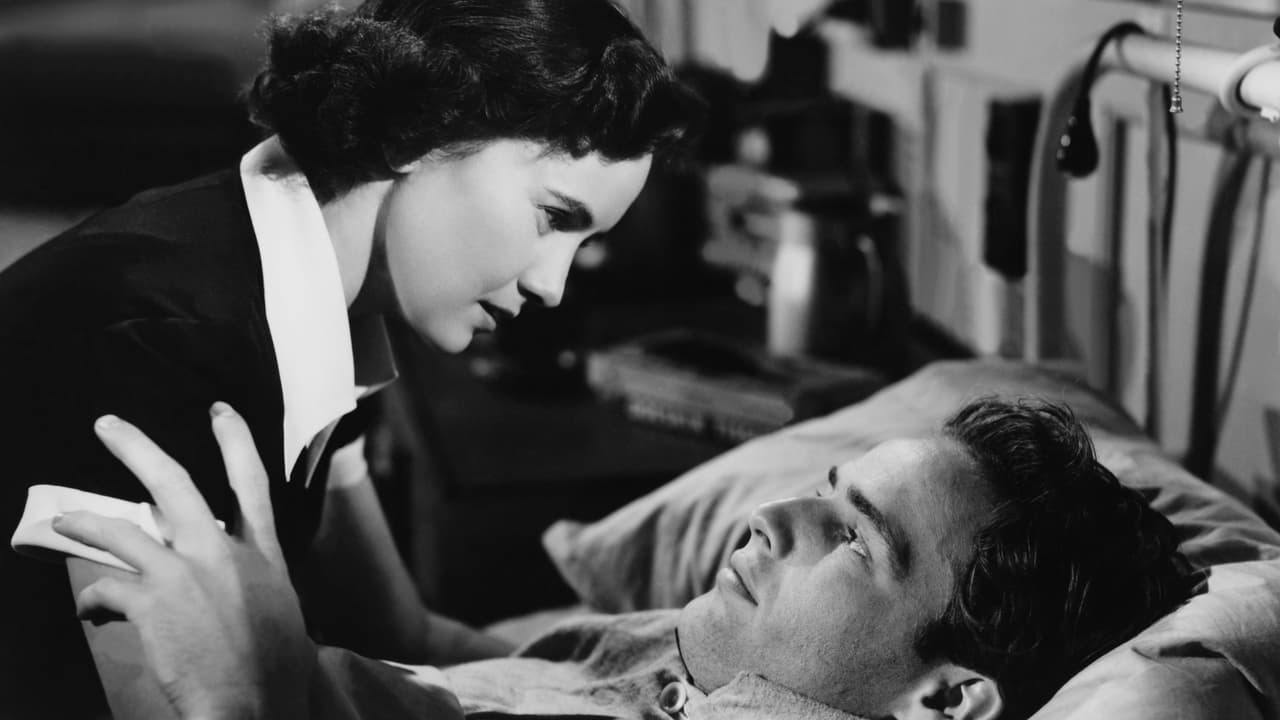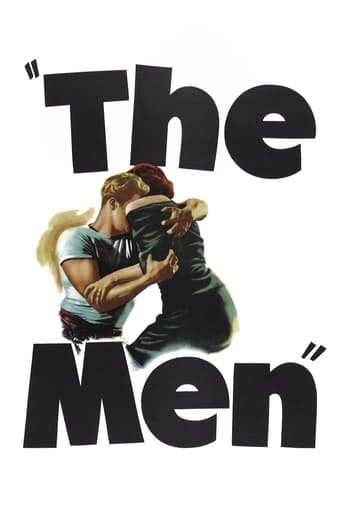



The performances transcend the film's tropes, grounding it in characters that feel more complete than this subgenre often produces.
View MoreGo in cold, and you're likely to emerge with your blood boiling. This has to be seen to be believed.
View MoreThis is a coming of age storyline that you've seen in one form or another for decades. It takes a truly unique voice to make yet another one worth watching.
View MoreStrong acting helps the film overcome an uncertain premise and create characters that hold our attention absolutely.
View MoreKen (Marlon Brando) gets shot in the back during the war leaving him paralyzed. It's been a year and he is still struggling to accept it. The blunt Dr. Brock (Everett Sloane) leads the doctors in the hospital. Ken's spirit is slowly lifted by his fellow patients. Ellen (Teresa Wright) is Ken's faithful fiancée.The subject is admirable and timely for the era. It's also Brando's first theatrical performance. The thing is that he's already a great actor. He's able to project emotions even when he's lying flat on the bed. His capabilities are there for all to see. This is a basic melodrama. It's very solid. I would like fewer patients so the characters have room to spread their wings. The mass of people can be hard to distinguish lacking greater depths to their characters. It also sucks up a lot of time and tension for expositions. Overall, this is a must-see even if it's simply for Brando.
View MoreThe first thing that you need to be aware of when watching The Men is that it is NOT a war film. There are no explosions and outside of the first couple of minutes there are no guns being fired etc. If that's the sort of film that you're looking for then you should look elsewhere.The Men focuses on the after effects of paralysis on a group of war veterans. The main focus is on Ken (Marlon Brando). Ken struggles to accept his paralysis and seemingly shuns help from anyone - at the start of the film he's effectively a martyr. He even refuses to allow his fiancé to visit him - this may seem cold, but in some ways it's understandable when we learn that he was a very active person, he was a football player, a war hero. I suppose he wants her to remember him like that and he doesn't want her to pity him. However, his fiancé Ellen (Teresa Wright)still loves him even though he's paralysed and that's because she sees that he's still the same person that she fell for before he went to war.The thing I really liked about this film is the screenplay; it actually challenges the viewers thoughts and pre-conceptions. Ellen loves Ken in spite of his paralysis, but her parents and Ken's doctor try to talk her out of marrying him. The doctor reasons are more rational and relate to the practical cost and time involved in looking after someone with paralysis. However, her parents basically don't want Ellen to be with Ken because they no longer deem him to be the perfect son now that he's paralysed. Ellen defies her parents' wishes which wouldn't seem like much now, but was probably quite brave in 1950. It really was wonderful to see Ellen stick by Ken.Ken's character was also well-written in the sense that he's never made likable in such a way that we pity him (which is good because I don't think that was the effect that the writers were striving for). However, he's also never so repulsive that we end up hating him. The balance was just about right with his character.Another strong factor working in the film's favour is the wonderful chemistry between Ken and Ellen. They both put in terrific, heart felt performances which only helped to increase the appreciation that I have for this film.If you're a fan of moving dramas then this is definitely worth checking out.
View MoreFred Zinnemann, born in Austria-Hungary, was very interested in the neo- realist movement of Italian cinema and its raw approach to reality. After making numerous films in Hollywood, he finally directed "The Men" (1950) which is arguably the closest he ever got to the style of the era. Knowing the neo-realist movement and its style, it's no wonder that the icon of post-war youth and its rebellion, Marlon Brando, did his debut performance in the film. What is more, one can truly observe Zinnemann's great fascination for documentary in "The Men". In fact, without the romantic subplot the film could be seen as a (neo)-realist reportage of the bleak reality of the war veterans' hospitals. On the other hand, the love story, represented by Marlon Brando and Teresa Wright, gives depth to the drama and, all in all, a new dimension to the film. "The Men" begins with a flashback sequence where men are strolling the paths of glory toward the fortress of doom. The protagonist recalls his accident which led to his paralysis: "I was afraid I was going to die. Now I'm afraid I'm going to live." Thus starts the tale of an individual's painful journey from desperate denial to acceptance of one's own condition and physical restriction.In addition to the neo-realist aesthetics, the documentary-like nature of the film is revealed in its honesty. Beside themes of readjustment and human fragility, many critics have commended the film's ability to discuss the sexual problems of paraplegic men, though rather subtly. My biggest complaint regarding the stylistics of the film is the musical score composed by the talented Max Steiner. All in all, his flamboyant score does not fit a film which has been stripped from all excessive decoration. The score feels strange, as if added from the outside, in the nearly Bressonian aesthetics. Alfred Hitchcock's "The Wrong Man" (1956) suffered from similar treatment. To my mind, "The Men" didn't need a score at all — or at least it could have done better with a restrained soundtrack.Fortunately, music is just one element in "The Men". Discussing the film, it is essential to take its title in consideration. For "The Men" is truly a film about the men who came back from the war to fight another. Although the focus isn't as social as in "The Best Years of Our Lives" (1945), for instance, the film shouldn't be blamed for thematic thinness. The title refers to the characters, the young men, who fought in the front and now continue the inner war with themselves. They experience severe social pressure for not fitting in and losing their manhood.One element which fascinated Zinnemann about neo-realism was its tradition of filming in the streets. Partially due to this, "The Men" is filmed in an actual veterans' hospital. According to what I've read, Zinnemann and Brando spent a few weeks at the hospital before shooting and became a part of its environment. In fact, many of the patients are in the finished film as characters. As a consequence, an emotion of solidarity and authentic care exhales from the film that salutes to endurance and triumph over physical obstacles. If "The Men" is stylistic, touching and well crafted altogether, what then truly separates it from the rest? For example, "Hôtel des Invalides" (1952), "Johnny Got His Gun" (1971) and "Born on the Fourth of July" (1989) all deal with war veterans' paralysis and readjustment or its failure in a more or less original fashion. Yet, if Franju's film is poignant and intelligent, Trumbo's nihilist and Wood's biographical — all of them being uncompromisingly pacifistic — Zinnemann's film is, above all, emotional. By saying this I am not, however, referring to the romantic subplot of "The Men", but to its great humanism.
View MoreMarlon Brando in "The Men" played a character quite similar to the one portrayed by Harold Russell in "Best Years of Our Lives." Both men had been seriously damaged (physically and psychologically) by the ravages of wartime combat. Both had major problems returning to civilian life. Both were decent men caught up in the terrible personal conflict of reconnecting with sweethearts left behind who still wanted to marry them. Ultimately both adjusted to their situation and the ending in both films----if not happy-----was certainly optimistic."The Men" is by far the more worthy story because it contained the greater reality. The many details that contributed to the Brando character's attitude are fully fleshed out----and leave no doubt about what they were and why they were important to better understand his feelings and emotions. Russell's character is not fully realized----perhaps because there were several other story lines in his film.Is Fred Zinnemann a better director than William Wyler? Maybe not. But in this one instance---when each directed a similar story----Zinnemann achieved the greater work of art----a classic in its own right.
View More